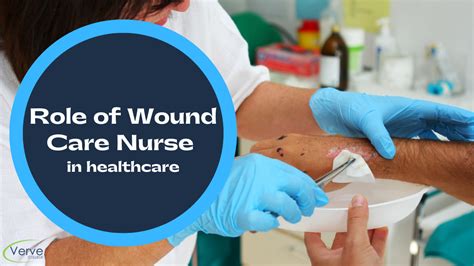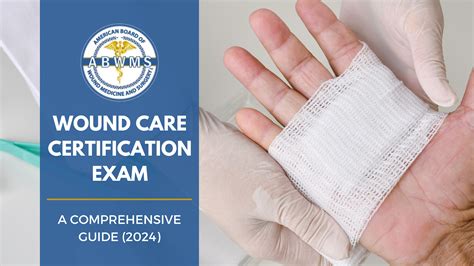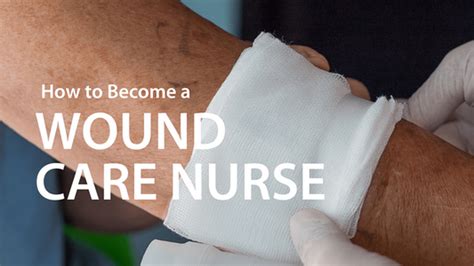Intro
Advance your nursing career with specialized wound care training. Learn 5 ways to become a certified wound care nurse, including education requirements, certification programs, and professional development opportunities. Discover how to enhance patient outcomes, master wound assessment skills, and excel in this in-demand nursing specialty.
The demand for wound care nurses is on the rise, driven by the growing need for specialized care in hospitals, clinics, and long-term care facilities. As a nurse, becoming certified in wound care can enhance your career prospects, boost your earning potential, and most importantly, enable you to provide high-quality care to patients with complex wounds. In this article, we will explore the five ways to become a certified wound care nurse.
What is Wound Care Nursing?

Wound care nursing is a specialized field of nursing that focuses on the prevention and management of wounds, including acute and chronic wounds, pressure ulcers, and diabetic foot ulcers. Wound care nurses work closely with patients, families, and healthcare teams to develop and implement individualized care plans that promote wound healing, prevent complications, and improve patient outcomes.
Benefits of Wound Care Certification

Becoming certified in wound care can bring numerous benefits to your nursing career, including:
- Enhanced career prospects: Wound care certification demonstrates your expertise and commitment to providing high-quality care, making you a more attractive candidate to potential employers.
- Increased earning potential: Certified wound care nurses can earn higher salaries compared to non-certified nurses, with median salaries ranging from $80,000 to over $110,000 per year.
- Improved patient outcomes: Wound care certification equips you with the knowledge and skills to provide evidence-based care, leading to better patient outcomes and reduced healthcare costs.
- Professional growth: Certification can lead to advanced practice roles, leadership positions, and opportunities for education and research.
5 Ways to Become a Certified Wound Care Nurse
1. Meet the Eligibility Requirements
To become certified in wound care, you must meet the eligibility requirements set by the certifying organization. These requirements typically include:
- A current RN license
- A minimum number of hours of wound care experience (varies by organization)
- Completion of a wound care education program (varies by organization)
2. Choose a Certifying Organization
There are several certifying organizations that offer wound care certifications, including:
- American Board of Wound Management (ABWM)
- Wound, Ostomy, and Continence Nursing Certification Board (WOCNCB)
- National Alliance of Wound Care and Ostomy (NAWCO)
Each organization has its own certification process, eligibility requirements, and exam format.
3. Prepare for the Certification Exam
To prepare for the certification exam, you can:
- Complete a wound care education program
- Attend workshops and conferences
- Join a study group or online community
- Use online resources and study materials
4. Pass the Certification Exam
The certification exam typically consists of multiple-choice questions that test your knowledge and skills in wound care. The exam format and content vary by organization, but most exams cover topics such as:
- Wound assessment and diagnosis
- Wound treatment and management
- Wound prevention and risk reduction
- Patient education and counseling
5. Maintain Certification
To maintain certification, you must meet the continuing education requirements set by the certifying organization. This typically includes completing a certain number of continuing education hours in wound care and paying a recertification fee.
Conclusion

Becoming certified in wound care can be a rewarding and challenging career move. By meeting the eligibility requirements, choosing a certifying organization, preparing for the certification exam, passing the exam, and maintaining certification, you can demonstrate your expertise and commitment to providing high-quality care to patients with complex wounds. Whether you're just starting your nursing career or looking to advance your skills, wound care certification can open doors to new opportunities and enhance your career prospects.
What is the difference between wound care certification and wound care education?
+Wound care certification is a credential that demonstrates your expertise and knowledge in wound care, while wound care education is a program that teaches you the skills and knowledge needed to provide wound care. Certification is not the same as education, and certification requires meeting eligibility requirements and passing an exam.
How long does it take to become certified in wound care?
+The time it takes to become certified in wound care varies depending on the certifying organization and your individual circumstances. Typically, it takes several months to a year to complete the certification process, including meeting eligibility requirements, preparing for the exam, and passing the exam.
Is wound care certification recognized internationally?
+Wound care certification is recognized in many countries, but the recognition and acceptance of certification vary by country and employer. It's essential to check with the certifying organization and potential employers to determine the recognition and acceptance of certification in your desired location.
